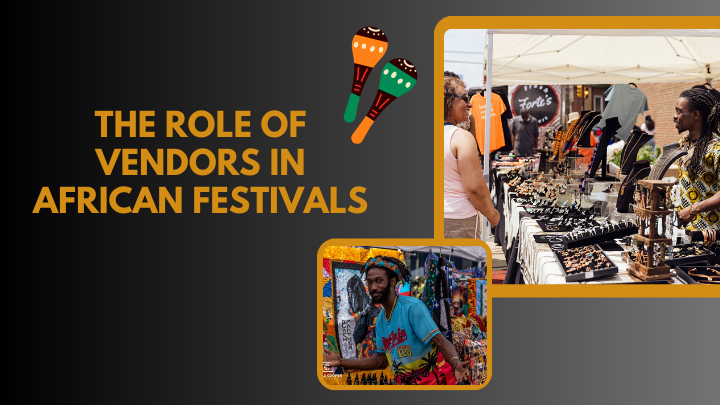The role of vendors in African Festivals
African cultural festivals in Australia have become vibrant celebrations of the continent’s rich traditions, music, art, and cuisine. These festivals serve as platforms for showcasing the diversity and beauty of African cultures, and at the heart of these celebrations are the vendors who contribute in meaningful ways. From providing authentic food and crafts to offering unique services, vendors play a crucial role in supporting local businesses and artisans while enhancing the overall festival experience.
Authentic African Cuisine: A Taste of Tradition
One of the most celebrated aspects of African festivals is the food. African cuisine is as diverse as the continent itself, with each region offering unique flavors, ingredients, and cooking techniques. Vendors at African cultural festivals bring these authentic tastes to life, allowing attendees to explore the rich culinary traditions of Africa.
Supporting Local African Food Entrepreneurs For many African food vendors, these festivals provide an essential platform for introducing their native dishes to the Australian community. Whether it’s the spicy stews of East Africa, the savory jollof rice of West Africa, or the grilled meats and braai of Southern Africa, festival-goers can enjoy a variety of authentic dishes that remind them of home or introduce them to new flavors.
Boosting Local and International Recognition By participating in these festivals, food vendors can grow their businesses, build relationships with local customers, and gain recognition for their culinary expertise. It’s an opportunity for small-scale food entrepreneurs to showcase their skills and educate others about the diverse food cultures of Africa. It also fosters a sense of pride among African diaspora communities, who get to see their food traditions celebrated and respected.
Handmade Crafts: A Window Into African Art
African festivals also provide a platform for artisans and crafters to showcase their talents. Traditional African crafts are known for their intricate designs, bright colors, and cultural significance. From beaded jewelry and woven baskets to colorful fabrics and hand-carved sculptures, the work of these artisans represents the beauty and heritage of Africa.
Support for Local Artisans Vendors selling handmade crafts and artwork are essential for promoting African craftsmanship and supporting local artisans. Many of these crafts are passed down through generations, reflecting the artistic traditions of specific African regions. These festivals help artisans gain recognition and earn income by connecting them with potential customers who appreciate the cultural value of their work.
Preserving African Heritage By selling traditional crafts at festivals, these artisans help preserve African cultural practices and pass them on to future generations. The use of authentic materials, such as beads, wood, and textiles, allows them to continue time-honored techniques while offering something unique to festival attendees. It’s an opportunity for cultural exchange, where visitors can learn about the significance of the crafts and the stories behind them.
Vendors as Cultural Ambassadors
Vendors at African festivals are not just selling goods; they are cultural ambassadors who share their knowledge and traditions with a wider audience. Their stalls serve as cultural touchpoints, offering insight into the history, meaning, and significance of the products they sell.
Cultural Exchange and Education For many festival-goers, it’s an opportunity to learn about African cultures in an immersive way. Vendors often take the time to explain the symbolism behind a particular piece of art, the ingredients in a dish, or the importance of a certain tradition. This interaction fosters greater understanding and appreciation of African cultures, while also encouraging a sense of community and solidarity among festival-goers of all backgrounds.
Supporting Local Communities Vendors are integral to building a sense of unity and pride within African communities. By purchasing from local vendors, festival-goers are directly supporting small businesses, often owned and operated by members of the African diaspora. This economic boost helps these businesses thrive, strengthens community ties, and empowers local entrepreneurs to continue their craft.
Services and Entertainment: Enhancing the Festival Experience
In addition to food and crafts, many African festivals feature vendors offering services that enhance the overall festival experience. From hairstyling and face painting to traditional dance performances and storytelling, these vendors contribute to the cultural richness of the festival.
Promoting African Traditions Through Services Vendors offering services such as hairstyling (for example, traditional African hair braiding) or face painting often incorporate cultural designs and symbols into their work, giving festival-goers an opportunity to experience African beauty traditions first-hand. These services help preserve and share important aspects of African cultural identity, providing a personal, interactive way for attendees to engage with the culture.
Creating a Complete Festival Atmosphere Other vendors might offer entertainment, such as live performances or storytelling, which enhances the atmosphere of the festival. These performances often highlight African music and dance, helping to bring the festival’s theme to life and engage attendees in the celebration of African culture.
The Economic Impact: Vendors as Catalysts for Growth
The participation of vendors at African festivals has broader economic benefits. Not only do they provide valuable services and goods, but they also stimulate the local economy. Festival-goers often spend money at vendor stalls, which in turn supports local businesses and encourages the growth of cultural industries.
Fostering Long-Term Economic Growth For many vendors, these festivals serve as an introduction to new customers, creating a sustainable source of income. The exposure gained at these events can lead to opportunities for growth, such as collaborations with other businesses, more customers, and even the chance to open permanent storefronts. In this way, African festivals help foster long-term economic growth for local businesses and artisans.
Vendors play an essential role in African cultural festivals in Australia, offering authentic food, crafts, services, and entertainment that enrich the festival experience. They support local businesses, empower artisans, and promote African cultural heritage. Through their participation, they help build bridges between African communities and the broader Australian public, creating opportunities for cultural exchange, economic growth, and lasting impact. By supporting these vendors, festival-goers contribute to the preservation and celebration of Africa’s diverse traditions, making these festivals an invaluable part of the cultural landscape in Australia.



